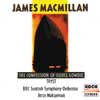MacMillan Orchestral Works
View record and artist detailsRecord and Artist Details
Composer or Director: James MacMillan
Label: Gramophone Awards Collection
Magazine Review Date: 10/1992
Media Format: CD or Download
Media Runtime: 54
Mastering:
Stereo
DDD
Catalogue Number: 31050-2

Tracks:
| Composition | Artist Credit |
|---|---|
| (The) Confession of Isobel Gowdie |
James MacMillan, Composer
BBC Scottish Symphony Orchestra James MacMillan, Composer Jerzy Maksymiuk, Conductor |
| Tryst |
James MacMillan, Composer
BBC Scottish Symphony Orchestra James MacMillan, Composer Jerzy Maksymiuk, Conductor |
Author: Stephen Johnson
This time the publicity doesn't exaggerate. The premiere of The Confession of Isobel Gowdie at the 1990 Proms was a ''spectacular triumph''—nothing less—and this with an audience drawn largely (one presumes) by Beethoven's Fourth Symphony and Sibelius's Violin Concerto.
But success can fade with alarming rapidity. What matters now is that two years later, away from the uplift of that extraordinary reception, The Confession of Isobel Gowdie tells its story as
stirringly as ever. If MacMillian's programme (the martyrdom of a Scottish Catholic 'witch') seems over-pictorial, no problem; the progression from rapt modal string threnody (complete with keening glissandos) through mounting violence to the re-emergence and transformation of the modal lament is as easy to follow as the 'narrative' of a Mahler symphony—and the after-effect isn't all that dissimilar.
Others may be bothered by undisguised echoes of other composers: Copland, Messiaen, Stravinsky, Ives, the famous single-note crescendo from Berg's Wozzeck (though in MacMillan it's c, not b)... I admit that some of them bothered me at first, but I can see now that the fact that they are undisguised is part of their strength—that and the way they are so obviously drawn into the argument. Of course the quality of the performance matters, and Maksymiuk and the BBC SSO give the kind of penetrating performance which (usually) only comes from long involvement. A warmer, less studio-ish recording might have lent extra voice (the strings' thenody needs both more intimacy and more atmosphere), but the main points still come across with power. Tryst too emerges well: the forces may be smaller, but the head-on confrontation of violence with calmer, more humane sounds again generates a compelling musical drama, and the ending, though less spectacular than Isobel Gowdie's final one-tone immolation, works both as an imaginative conclusion and a challenge to go back and dig deeper. Away with caution! Composers don't tell players to balance potatoes on piano strings or to blow into their cellos anymore. So why not give this direct, unequivocally heart-felt music a try?'
But success can fade with alarming rapidity. What matters now is that two years later, away from the uplift of that extraordinary reception, The Confession of Isobel Gowdie tells its story as
stirringly as ever. If MacMillian's programme (the martyrdom of a Scottish Catholic 'witch') seems over-pictorial, no problem; the progression from rapt modal string threnody (complete with keening glissandos) through mounting violence to the re-emergence and transformation of the modal lament is as easy to follow as the 'narrative' of a Mahler symphony—and the after-effect isn't all that dissimilar.
Others may be bothered by undisguised echoes of other composers: Copland, Messiaen, Stravinsky, Ives, the famous single-note crescendo from Berg's Wozzeck (though in MacMillan it's c, not b)... I admit that some of them bothered me at first, but I can see now that the fact that they are undisguised is part of their strength—that and the way they are so obviously drawn into the argument. Of course the quality of the performance matters, and Maksymiuk and the BBC SSO give the kind of penetrating performance which (usually) only comes from long involvement. A warmer, less studio-ish recording might have lent extra voice (the strings' thenody needs both more intimacy and more atmosphere), but the main points still come across with power. Tryst too emerges well: the forces may be smaller, but the head-on confrontation of violence with calmer, more humane sounds again generates a compelling musical drama, and the ending, though less spectacular than Isobel Gowdie's final one-tone immolation, works both as an imaginative conclusion and a challenge to go back and dig deeper. Away with caution! Composers don't tell players to balance potatoes on piano strings or to blow into their cellos anymore. So why not give this direct, unequivocally heart-felt music a try?'
Discover the world's largest classical music catalogue with Presto Music.

Gramophone Digital Club
- Digital Edition
- Digital Archive
- Reviews Database
- Full website access
From £8.75 / month
Subscribe
Gramophone Full Club
- Print Edition
- Digital Edition
- Digital Archive
- Reviews Database
- Full website access
From £11.00 / month
Subscribe
If you are a library, university or other organisation that would be interested in an institutional subscription to Gramophone please click here for further information.




